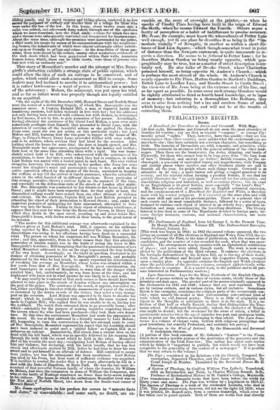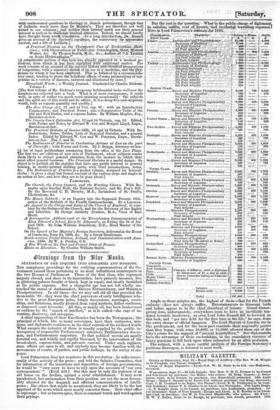PUBLICATIONS RECEIVED.
Booxs.
A Handbook for Travellers in Devon and CorincrilL With Maps. [At first sight, Devonshire and Cornwall do not seem the most attractive of counties for tourists • nor are they as regards "company " or (except Ply- mouth) actual " sights." They, however, hare this quality—they are leas commonplace than other counties more unlike what the excursionist can see anywhere else ; they have certainly not a foreign character, but something as fresh. The beauties of Devonshire are wild, romantic and primitive, while Dartmoor contrasts its sternness with the general softness of the other land- scapes. Then there are the breakwater, the docks, shipping, and bustle of Plymouth, for those who cannot bear to be long away from " the busy hues of men"; Druidical, and ancient (or Arthur) British remains, for the ar- chaiologist ; a sea-coast of unrivalled beauty and magnificence, with Torquay and similar places where myrtles and other Southern plants are said to flourish all the year, for people whom such things tempt. Cornwall is as attractive in its way ; a more barren soil giving a rugged grandeur to its scenery, and the mineral refuse forming a peculiar feature, if one that too quickly illustrates the " ne quid mmis. Cornwall too has antiquities, and associations religious and historical, as well as curious places; but its coast to an Englishman is its great feature more especially the Land's End." Mr. Murray's selection of menthe; for an English autumnal excursion, and the commencement of a Handbook for England and Tfrales, i therefore made with his wonted judgment. It is executed on the same plan and with the same skill and care as his previous guides. There is a general view of each county and its most remarkable features, followed by a series of tours, designed to embrace each object of interest in an orderly way ; practical in- formation and maps accompanying the travelling directions. 'The literary interest is less than in some of the Handbooks devoted to foreign parts, be- cause foreign manners, customs, and national characteristics, are more wanting.] The Parliaments of England, from 1st George L to the Present Time. By Henry Stooks Smith. Volume III. The Disfranchised Boroughs, Scotland, Ireland, &c.
[This work was begun in 1844; in 1845 the second volume appeared, the two giving an account of all the elections in England and Wales, from 1715, the ac- cession of George the First, to the time of publication, with the names of the candidates, and the number of votes recorded for each, when that was ascer- tainable. The arrangement was by counties with an alphabetical subdivision of places ; and notes were added, though rarely. The work is now com- pleted by the publication of the third volume. It contains the elections in the boroughs disfranchised by the Reform Bill, up to the day of their death; with those. of Scotland and Ireland since the .respective Unions, arranged upon a similar phut. An appendix contains the English and Welsh elections since the publication of the previous volumes, arranged alphabetically with- out reference to counties. It is a useful work, to the publicist and to all per- sons interested in Parliamentary matters.]
Lyra Sanetornm. Lays for the Minor Festivals of the English Church. [A senes of poems written on the days of various saints, chiefly those of the primitive and dark ages. The greater part of the poems originally appeared in the Ecclesiastic for 1847 and 1848; whence they are now reprinted. They are by Various authors, and in various styles, but all imitative. Sometimes Byron is the exemplar, sometinice the religious poets of the seventeenth cen- tury; more usually the model is that well-sounding conventional kind of verse which we call Annual poetry. There is as little of originality and 'vigour in the thoughts or sentiments as there is in the style. It is a re- flection of that half or wholly Romish feeling that distinguishes the Trac- tarian school. If challenged theologically, indeed, the character of Tracta- non might be denied; but the reverence for the name of saints, a belief hi questionable miracleswheu the age of miracles was past, and analogous traits, seem to point out the writers as belonging to that school. The Lyra Sane torrent is a volume of elegant verse, written with religious promptings and good intentions, but scarcely Protestant, and certainly not poetry.] Gleanings in the West y- Ireland. By the Honourable and Reverend S. Godoliphin„: Osborne. [A portion of h. book consists of Mr. Osbome's "Letters" to the Times, which drew Ruche terrible picture of the destitution of the peasantry and the administration of the Irish Poor-law. The author has added some matter which he thinks it "important to publish, but which would not have been acceptable to the generality of the readers of a newspaper." It is possible that we may return to the volume.] The Pope ; considered in his Relations with the Church, Tomporul So- vereignties, Separated Churches, and the Cause of Civilization. By Count Joseph de 21faistre. Translated by the Reverend 1Eneas Me D. Dawson.
A System of Theology, by Godfrey William Ton Lerlmitz. Translated, with an Introduction and Notes, by Charles William Russell, 1)1)., Professor of Eeclesiastical History in St. Patrick's College, Maynooth. Two translations of Romanist books that have been before the world for thirty years and more. The Pope was written by a Legitimist in 1816-17. The Spiess of Theology is a work of the celebrated Leibnita, who died ma 1716. This posthumous work, however, did not see the light till 1820; when it was printed, Dr. Russell says, from a careless transcript, which error he has taken care to guard against. Both of them are works that deal directly
slaloms by whoin it-has been e This is fell db arecommenda,-
riodical, from w additional matter. The of turpentine, 'waif a summary use heel, efficinei.and tory essay, tending to- rove tbeeftacial effects of-soine preparations of tur- pentine in a variety of diseases, enforced au illustrated by cases.3
work consists of an.froCR. CffitiiiiNattlaparations
[A considerable portion ofthJibok Appeared in a medical pe- with controverted questions in theol3oS.church government, though that interest is such as to ch 11. - e ttnnsuritifteidion. Indeed, we should hardly of Leibnitz much more than Be T's. They are therefore not well suited to our columns ;;;.t.nitle neither' • "liteitryanerit nor their general gives an account el' the 11/stern'e seputtlre, the controversy itrvgapeeranee excited, and a life-4f Leibnitx.]-- • have thought them worertranslation. pan along. introductioneoP6441#0 - -A Practcal Meaticfan ti1skee Uses f. Tere,b,ih,uV "I1It,V1s9Ja
on Acute vfirireeepleilinam '', aa '
Waters, &e: By Thorbaam1thoM.D.,.&i..;4Aiitkai4iL, ■ , ' ' enes/ whOatinLTn1tnlar
i e 1, :COOS•11M40.4:,_ 'ff151(
21199 •wq ie ,Ebnoti piton'
4g E Household Words; a Weekly Journal; Conducted by Charles Dickens. Volume I.
[The first volume of Mr. Dickens's twopenny hebdomadal looks well now the numbers are collected into a book. What is of more consequence, it reads well., in spite of rather too much word-spinning. occasionally : the subjects and the spirit are of this werld and its affairs. It Is a cheap five-and-sixpenny
worth, both as regards quantity and quality.] ,
27w New Stamp Act, 13 and 14 Viet. cap. 97: with an Introductory Commentary, and Practical Notes ; also a Comparative Table of the Old and New Duties, and a copious Index, By William Hughes, Esq., Barrister-at-law.
The County Court Extension Act, 130=114 Victoria,. cap. 61. Edited, with Forms and Notes, by Edward W. Cox and Morgan Lloyd, Esqrs., Barristers-at-law.
The Practical Statutes of Session 1850, 13 and 14 Victoria. With In- troductions, Notes, Tables, "Lists of Repealed Statutes, and a gene.ral Index. Edited by Edward V. Cox and W. Paterson, Esqrs., Barris- ters-at-law. Nos. L and IL 27,e Rudiments of Practice in Conducting Actions at law on the part of Plaintiffs; with Forms and Costs. , By J. Briggs, Attorney-at-law. [A lot of legal publications emanating from the office of the Law Times.
The first two are editions of new acts of Parliament, whose subjects render
them likely to attract .general attention' from the manner in which they must affect general business. The l'ractical Statutes is a useful design : its object is to publish all the statutes that have any public interest or general bearing, in neatly-printed shilling parts, with brief introductions, notes, &c. The Rudiments of Practice is a pocket volume, designed for lawyers' clerks : it gives a clear but formal account Of the various steps and stages in an action at law, and how they, are to be gone about]-
PAMPHLETS.
The Church, the Privy Council, and the IVorking Classes. With Re- marks upon Knellar Hall, the National Society, and Mr. Fox's Bill. By the Reverend C. IL Bromby, M.A., Incumbent of St. -PauPe, Cheltenham, &c.
The Mosaic Sabbath ; or an Inquiry into the Supposed Present Obli- gation of the Sabbath of the Fourth Commandment. By a Layman. An Appeal to the Clergy and Laity of the Church of England, to com- bine for the Defence of the Church, and for the Recovery of her Fi ts and Liberties. By George Anthony Denison, ILA., Vicar of East Brent A Retrospective Address read at the Tercentenary Commemoration of Xing ward's School Bury St. _Edmund's, on Friday the 2d of Au- gust 1850. By John William Donaldson, D.D.,_ Head Master of the
School. _ _
On the Speech of her Majesty's Foreign Secretary, delivered in the House of Commons; June 25, ISM, &c. By a Greek Gentleman. South-western Packet Station Ireland, and Communication with Ame- rica. 1850. By W. A. Purcion, C.E. A Few Words on-the Past and Present State of France. Hints on Elocution. Breharles William Smith.



























 Previous page
Previous page